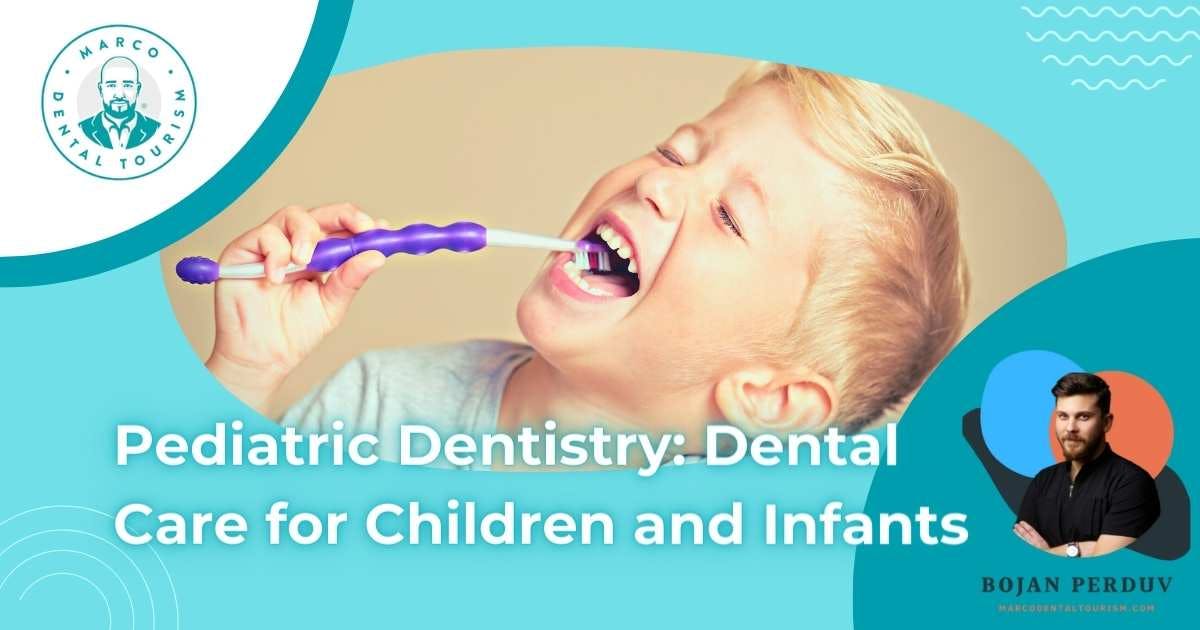Children's dentistry

The saying goes that a healthy mouth is the gateway to a healthy body, and this is especially true for children. That is why it is extremely important to understand the basics of children's dentistry, as well as the guidelines to follow when finding the right dentist for your child. In this blog, we will explore all the details of children's dentistry, from preventive care to curative treatment. Whether your child has just started teething or you are looking for the best ways to keep their smile healthy, this blog will provide you with the information you need to make the best decision for your child's dental health.
What is pediatric dentistry? - Definition

Children's dentistry is a specialized branch of dentistry focused on the unique needs of children. It focuses on the preventive care of teeth and gums with the aim of establishing the basis of long-term oral health of children, as well as the diagnosis and treatment of variousdental problems characteristic of children's age.
What does pediatric dentistry include?

Children's dentistry includes a variety of treatments designed to keep children's teeth healthy and strong. Some of the key treatments involved in pediatric dentistry include:
Regular check-ups: Regular dental check-ups are crucial for the healthy development of children's teeth. During the examination, the dentist will examine the child's teeth and gums in detail, provide preventive care and detect all early signs caries or other diseases.
Cleaning: Cleaning is a necessary step to remove plaque, tartar and food residues from the teeth. It is usually performed every six months and is often followed by fluoride treatments.
Fluoride treatments: Fluoride treatments can help strengthen tooth enamel and reduce the chance of tooth decay in children. These treatments are safe for children and can be recommended by the dentist depending on the age and oral health of the patient.
Filling or sealing: Filling is a common procedure in children's dentistry. During the treatment, the dentist will remove the accumulated caries and then fill the tooth cavity with a composite material. The composite resin used to fill the tooth is designed to restore the strength and function of the tooth.
Orthodontic care: Orthodontics is a branch of dentistry specialized in correcting the incorrect position of the teeth and jaw. Treatments include the use of braces and other orthodontic appliances to correct misalignment, crowding and other problems with the child's teeth and jaw.
Education: Education involves teaching and raising children's awareness of the importance of oral health and how to practice good oral hygiene habits, as well as how toovercome the fear of the dentist, feeling cozy and comfortable with each subsequent visit.
Why is children's dentistry important?

Children's or pediatric dentistry is extremely important for a child's overall health and well-being. Here are the most relevant reasons why the existence and further development of children's dentistry is very important:
Healthy teeth and gums: Regular dental checkups and preventative treatments can help ensure that children's teeth and gums stay healthy. Early detection and treatment of any dental problems can help avoid more serious problems in the future.
Caries prevention: Regular visits to the dentist can help prevent the development of caries and other dental problems such as dental erosion or loss of tooth structure.
Oral hygiene training: Children's dentistry can provide children with the opportunity to learn about the importance and benefits of good oral hygiene. Early learning can help develop good oral health habits throughout your life.
Nutrition: Pediatric dentistry can give children the opportunity to learn about the importance of a balanced diet and healthy eating habits. Teaching children about the impact of food on the teeth is a crucial factor in acquiring healthy dental habits. Our diet provides us with the essential nutrients we need for strong teeth and gums.
Early detection of orthodontic problems: Regular dental checkups can help detect any orthodontic problems early. This can help avoid the need for more serious orthodontic treatments in the future.
Stress relief: Visiting the dentist can be a stressful experience for some children. Regular visits to the dentist can help you relax, as well as reduce the stress and anxiety associated with going to the dentist.
Positive experience: Children's dentistry can help create a positive experience that carries over into a lifelong positive attitude toward dental and health care in general.
What is the difference between pediatric and general dentistry?

Children's dentists are specially trained to treat children's teeth, gums and mouth, while general dentists treat adults of all ages. Pediatric dentists use different techniques and materials than general dentists to ensure the best outcome for their young patients.
Can a general dentist deal with children's dentistry?

Of course! A general dentist can practice pediatric dentistry with specialized training. With this type of training, general dentists can provide children with a range of services, such as early cavity detection and preventive care, to ensure that the youngest patients have healthy teeth and gums.
What is dental sedation?

Dental sedation is a safe and effective relaxation method that helps reduce patient stress during dental procedures. It can be used for various treatments such as cleaning and filling teeth. Dental sedation allows patients to relax and feel comfortable during examinations and procedures.
What does dental sedation look like?
Oral sedation is taking a tranquilizer pill before dental treatment, resulting in a more relaxed and pleasant experience. The effects of sedatives depend on the dose given, but generally speaking, they can lead to a feeling of deep relaxation, sleepiness and inability to remember much of the procedure.
Is sedation normal in pediatric dentistry?
Yes, sedation is normal in pediatric dentistry. Sedation is used to help children who are anxious or fearful during dental procedures, as well as to provide a more comfortable experience for children who require multiple treatments. Pediatric dentists are specially trained in the safe use of sedation.

It is recommended that children start visiting the dentist before their first birthday. Regular check-ups are important to ensure that problems are diagnosed and treated as soon as possible. The dentist can also give relevant advice on oral hygiene habits and the best diet for your child.
Conclusion

To sum it up, pediatric dentistry is a field that is constantly evolving with the simultaneous advancements in science and technology that help and contribute to it. With proper care and education, children's teeth can remain healthy and strong throughout their lives. Parents should play a vital role in ensuring good dental health in children by providing the right role model by reinforcing healthy habits and instilling the importance of regular visits to the doctor.














Share your opinion!
What do you think about this topic?
Comments (0)